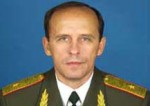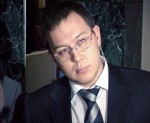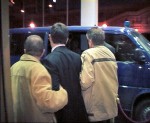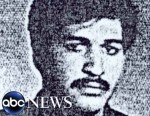Le "livre vert" est un manuel de l'IRA, Irish Republican Army, sur la conduite que doivent adopter les membres de l'organisation dans le cadre de leurs activités.
Irish Republican Army
The Green Book I
Commitment to the Republican Movement is the firm belief that its struggle both military and political is morally justified, that war is morally justified and that the Army is the direct representative of the 1918 Dail Eireann Parliament, and that as such they are the legal and lawful government of the Irish Republic, which has the moral right to pass laws for, and to claim jurisdiction over the territory, air space, mineral resources, means of production, distribution and exchange and all of its people regardless of creed or loyalty.
The most important thing is security. That means you:
DON`T TALK IN PUBLIC PLACES:
YOU DON`T TELL YOUR FAMILY, FRIENDS, GIRLFRIENDS OR WORKMATES THAT YOU ARE A MEMBER OF THE I.R.A. DON`T EXPRESS VIEWS ABOUT MILITARY MATTERS, IN OTHER WORDS YOU SAY NOTHING to any person. Don’t be seen in public marches, demonstrations or protests. Don’t be seen in the company of known Republicans, don’t frequent known Republican houses. Your prime duty is to remain unknown to the enemy forces and the public at large.
Another important thing volunteers must realise and understand is the danger in drinking alcohol and the very real danger of over-drinking. Quite a large body of information has been gathered in the past by enemy forces and their touts from volunteers who drank.Volunteers are warned that drink-induced loose talk is the MOST POTENTIAL DANGER facing any organisation, and in a military organisation it is SUICIDE.
[The recruit learns from Day One that:]
The Irish Republican Army, as the legal representatives of the Irish people, are morally justified in carrying out a campaign of resistance against foreign occupation forces and domestic collaborators. All volunteers are and must feel morally justified in carrying out the dictates of the legal government; they as the Army are the legal and lawful Army of the Irish Republic which has been forced underground by overwhelming forces.
The Army as an organisation claims and expects your total allegiance without reservation. It enters into every aspect of your life. It invades the privacy of your home life, it fragments your family and friends, in other words claims your total allegiance.All potential volunteers must realise that the threat of capture and of long jail sentences are a very real danger and a shadow which hangs over every volunteer. Many in the past have joined the Army out of romantic notions, or sheer adventure, but when captured and jailed they had after-thoughts about their allegiance to the Army. They realised at too late a stage that they had no real interest in being volunteers. This causes splits and dissension inside prisons and divided families and neighbours outside. Another important aspect all potential volunteers should think about is their ability to obey orders from a superior officer. All volunteers must obey orders issued to them by a superior officer whether they like the particular officer or not.
Before any potential volunteer decides to join the Irish Republican Army he should understand fully and clearly the issues involved. He should not join the Army because of emotionalism, sensationalism, or adventurism. He should examine fully his own motives, knowing the dangers involved and knowing that he will find no romance within the Movement. Again he should examine his political motives bearing in mind that the Army are intent on creating a Socialist Republic.
Volunteers are expected to wage a military war of liberation against a numerically superior force. This involves the use of arms and explosives. Firstly the use of arms. When volunteers are trained in the use of arms they must fully understand that guns are dangerous, and their main purpose is to take human life, in other words to kill people, and volunteers are trained to kill people. It is not an easy thing to take up a gun and go out to kill some person without strong convictions or justification. The Army, its motivating force, is based upon strong convictions which bonds the Army into one force and before any potential volunteer decides to join the Army he must have these strong convictions. Convictions which are strong enough to give him confidence to kill someone without hesitation and without regret. Again all people wishing to join the Army must fully realise that when life is being taken, that very well could mean their own. If you go out to shoot soldiers or police you must fully realise that they too can shoot you.Life in an underground army is extremely harsh and hard, cruel and disillusioning at times. So before any person decides to join the Army he should think seriously about the whole thing.
The nationhood of all Ireland has been an accepted fact for more than 1,000 years and has been recognised internationally as a fact. Professor Edmund Curtis, writing of Ireland in 800 AD says that ‘she was the first nation North of the Alps to produce a whole body of literature in her own speech’, and he is told how the Danes were driven out or assimilated by a people ‘whose civilisation was a shining light throughout Europe’, prior to the Norman invasion of 1169 with which there ‘commenced more than 8 centuries of RELENTLESS AND UNREMITTING WARFARE that has lasted down to this very day’.
The objective of the 800 years of oppression ‘is economic exploitation with the unjustly partitioned 6 counties remaining Britain’s directly controlled old-style colony’ and the South under the ‘continuing social, cultural, and economic domination of London’. This last led to Irish savings being invested in England ‘for a higher interest rate’ and many hundreds of thousands of boys and girls from this country had to emigrate to England to seek the employment which those exported savings created.
Another aspect of economic imperialism at work is the export of raw, unprocessed materials: live cattle on the hoof, mineral wealth, fish caught by foreign trawlers etc. Further, from 1958 on, the Free State abandoned all attempts to secure an independent economy, and brought in foreign multi-national companies to create jobs instead of buying their skills and then sending them home gradually.
‘Africanisation’ is the word for this process elsewhere. Control of our affairs in all of Ireland lies more than ever since 1921 outside the hands of the Irish people.
The logical outcome of all this was the full immersion in the E.E.C. in the 1970’s. The Republican Movement opposed this North and South in 1972 and 1975 and continues to do so. It is against such political economic power blocks East and West and military alliances such as NATO and the Warsaw Pact. It stands with our Celtic brothers and the other subject nations of Europe, and with the neutral and non-aligned peoples of the Third World; it seeks a third, socialist alternative which transcends both Western individualistic capitalism and Eastern state capitalism, which is in accordance with our best revolutionary traditions as a people.
The position of the Irish Republican Army since its foundation in 1916 has been one of sustained resistance and implacable hostility to the forces of imperialism, always keeping in the forefront of the most advanced revolutionary thinking and the latest guerrilla warfare techniques in the world.
The milestones, the battle honours won, the bloodstained trail of sacrifice, imprisonment, hunger strikes, executions, yet with telling blows delivered to the enemy, often in the heart of British imperialism itself, commanding the open admiration of freedom-loving peoples around the world.
Note: The moral position of the Irish Republican Army, its right to engage in warfare, is based on:
a) The right to resist foreign aggression
b) The right to revolt against tyranny and oppression
c) The direct lineal succession with the Provisional Government of 1916, the first Dail of 1919 and the second Dail of 1921.
In 1938 the seven surviving faithful Republican Deputies delegated executive powers to the Army Council of the I.R.A. as per the 1921 resolution. In 1969 the sole surviving Deputy, Joseph Clarke, reaffirmed publicly that the then Provisional Army Council and its successors were the inheritors of the first and second Dail as a Provisional Government.
Economic imperialism is evident on every main road and city street of Ireland: in Banking, Insurance, Merchant Marine, the Motor Industry, Mining, Fisheries, Industry in general, I.C.I., cultural imperialism epitomised in the Conor Cruise O’Briens of this Island, has been reinforced since the Treaty sell-out by successive Free State Governments via mass media, R.T.E., and the press and through education.
The injustice of being as an individual politically impotent, the injustice of unemployment, poverty, poor housing, inadequate social security, the injustice of the exploitation of our labour, our intelligence and our natural resources, the injustice of the bloody-minded destruction of our culture, our language, music, art, drama, customs, the inherent injustice of the state repression which is necessary to maintain the present system as a whole.
[So long as partition lasts a unified national concentration on correcting these injustices is not possible. ‘We must therefore first of all break the British connection’. The I.R.A. promises a democratic and socialist state]:
A Government system which will give every individual the opportunity to partake in the decisions which will affect him or her: by decentralising political power to the smallest social unit practicable where we would all have the opportunity to wield political power both individually and collectively in the interests of ourselves and the nation as a whole. Socially and Economically we will enact a policy aimed at eradicating the Social Imperialism of today, by returning the ownership of the wealth of Ireland to the people of Ireland through a system of co-operativism, worker ownership, and control of the industry, Agriculture and the Fisheries.
Culturally we would hope to restore Gaelic, not from the motivation of national chauvinism but from the viewpoint of achieving with the aid of a cultural revival the distinctive new Irish Socialist State: as a Bulwark against imperialist encroachments from whatever quarter. Internationally our alignment would hopefully be with the progressive Governments or former colonies like ourselves with the dual purpose of mutual advantage and of curbing the endeavours of imperialistic military and economic power blocs throughout the world.
A new recruit’s immediate obstacle is the removal of his (her) ignorance about how to handle weapons, military tactics, security, interrogations etc. An O.C.’s might be how to put a unit on a military footing; an I.O.’s how to create an effective intelligence network; a Cumann Chairman’s how best to mount a campaign on a given issue, e.g. H Blocks etc., and for all members of the movement regardless of which branch we belong to, to enhance our commitment to and participation in the struggle through gaining as comprehensive an understanding as possible of our present society and the proposed Republican alternative through self and group education.
Before we go on the offensive politically or militarily we take the greatest defensive precautions possible to ensure success, e.g. we do not advocate a United Ireland without being able to justify our right to such a state as opposed to partition; we do not employ revolutionary violence as our means without being able to illustrate that we have no recourse to any other means. Or in more everyday simple terms: we do not claim that we are going to escalate the war if we cannot do just that; we do not mount an operation without first having ensured that we have taken the necessary defensive precautions of accurate intelligence, security, that weapons are in proper working order with proper ammunition and that the volunteers involved know how to handle interrogations in the event of their capture etc., and of course that the operation itself enhances rather than alienates our supporters.
Even the given situations of adequate bomb warnings are exploited which is again our mistake in not having sufficiently considered our defensive before going on the offensive: the so-called Bloody Friday being the prime example. Either we did not stop to consider that the enemy would ‘Dirty Joe’ us on the warnings or we overestimated the Brits’ ability to handle so many operations. But regardless of which is the case we made the mistake and the enemy exploited it.
Other more everyday examples: the enemy exploits the mistake of a volunteer who stays in his own home by arresting him; he exploits the careless dumping of war materials by lifting them or, as is the most recent tactic, by assassinating volunteers who return to pick the materials up; he exploits I.R.A.-sticky [Official IRA] confrontations by staying out of the way to allow the subsequent detrimental publicity and effect on support to run its course; he exploits I.R.A.- Loyalist confrontations by moving in behind the I.R.A. unit and attacking it, plus again the detrimental international publicity.
We exploit the enemy’s mistakes by propagating the facts. So it was with their murderous mistakes of the Falls Road curfew, Bloody Sunday and internment, which were exploited to our advantage support-wise as was the murder of John Boyle in Dunloy.
Tactics are dictated by the existing conditions. Here again the logic is quite simple. Without support Volunteers, Dumps, Weapons, Finance, etc., we cannot mount an operation, much less a campaign. In September 1969 the existing conditions dictated that the Brits were not to be shot, but after the Falls curfew all Brits were to the people acceptable targets. The existing conditions had been changed.
Likewise at present, for example, although the leadership of the S.D.L.P. has proved itself to be collaborationist and thus an enemy of the people, at various stages since 1974 we could have employed the tactic of making them subjects of ridicule by tarring and feathering them when for instance they were members of an Executive which tortured and interned Irishmen, which penalised rent and rates strikers etc., or when they recently declared at Westminster in a debate on H Block that ‘ Life should mean Life and there should be no Political Status’. The defensive precaution in the latter example being of course that the people be made aware beforehand that they actually did make such an utterance.
The rule of thumb for all our actions can therefore be clearly seen to be that we must explain by whatever means we have at our disposal why we bomb, why we punish criminals, why we execute informers etc.
We do not exclude taking an action which does not completely fill the criteria of this analysis on how to conduct the struggle. Many instances have arisen and will arise again when we have had to step outside these general terms of reference to our immediate detriment propaganda-wise and support-wise. However even in such an eventuality, if we rationalise our action, get our defensive before our offensive, try to ensure that we have an alternative, relatively unaffected area of support from which to operate if the support in the area which the detrimental but unavoidable action takes place, we are adhering as best as possible under the circumstances to a proper conduct of the war.
THE ENEMY: CATEGORISE - CURE:
The enemy, generally speaking, are all those opposed to our short-term or long-term objectives. But having said that, we must realise that all our enemies are not the same and therefore there is no common cure for their enmity. The conclusion then is that we must categorise and then suggest cures for each category.Some examples: We have enemies through ignorance, through our own fault or default and of course the main enemy is the establishment.
The enemy through ignorance we attempt to cure through education though such an attempt is obviously futile if we do not firstly educate ourselves. Our means are marches, demonstrations, wall slogans, press statements, Republican press and publications and of course person-to-person communication. But as has already been stated, we must first educate ourselves, we must organise the protests and demonstrations efficiently, we must be prepared to paint the wall slogans and to sell and contribute to Republican press, Publications and Press statements.
The enemy through our own fault or default is the one we create ourselves through our personal conduct and through our collective conduct of the struggle: the wee woman whose gate or back door gets pulled off its hinges by a volunteer evading arrest and who doesn’t get an apology as soon as possible afterwards or more preferably has the damage repaired by one of our supporters; the family and neighbours of a criminal or informer who has been punished without their being informed why. In brief our personal conduct as well as our conduct of our Republican activities must be aimed at if not enhancing support, at least not creating enemies unnecessarily.
The establishment is all those who have a vested interest in maintaining the present status quo in politicians, media, judiciary, certain business elements and the Brit war machine compromising the Brit Army, U.D.R., R.U.C. ( r ) [reserve], Screws, Civilian Searchers. The cure for these armed branches of the establishment is well known and documented. But with the possible exceptions of the Brit Ministers in the ‘Northern Ireland Office’ and certain members of the judiciary, the overtly unarmed branches of the establishment are not so clearly identifiable to the people as our enemies as say armed Brits or R.U.C.
It is our task therefore to clearly identify them to the people as such and again depending on the existing conditions and our ability to get our defensive before our defensive, effect a cure. Execution, as earlier stated is not the only way of making this category of establishment enemy ineffective: we can variously expose them as liars, hypocrites, collaborators, make them subjects of ridicule etc., e.g. The ‘Mason-Superthug’ poster image, the ‘Captain Nervewreck’ cartoon strip, the Conor ‘Booze’ O’Brien pun etc.
GUERILLA STRATEGY:
Many figures of speech have been used to describe Guerrilla Warfare, one of the most apt being ‘The War of the Flea’ which conjured up the image of a flea harrying a creature of by comparison elephantine size into fleeing (forgive the pun). Thus it is with a Guerrilla Army such as the I.R.A. which employs hit and run tactics against the Brits while at the same time striking at the soft economic underbelly of the enemy, not with the hope of physically driving them into the sea but nevertheless expecting to effect their withdrawal by an effective campaign of continuing harassment contained in a fivefold guerrilla strategy.
The strategy is:
1. A War of attrition against enemy personnel which is aimed at causing as many casualties and deaths as possible so as to create a demand from their people at home for their withdrawal.
2. A bombing campaign aimed at making the enemy’s financial interest in our country unprofitable while at the same time curbing long term financial investment in our country.
3. To make the Six Counties as at present and for the past several years ungovernable except by colonial military rule.
4. To sustain the war and gain support for its end by National and International propaganda and publicity campaigns.
5. By defending the war of liberation by punishing criminals, collaborators and informers.
While one of our chief considerations in deciding tactics is the concern for our friends, relatives, neighbours, our people in the midst of whom we operate, the enemy is simply dealing with an impersonal, inferior foreigner, a ‘Paddy’, ‘Musck-Savage’ or ‘Bog-Wog’, and with the great added advantage of all the resources and back up of a conventional army, para-military police, etc., e.g. M.R.F., S.A.S., plain clothes units, covert surveillance teams etc. At this juncture the most obvious differences between the Brits and the I.R.A. volunteer, apart from the fact that the Brit is an uninvited armed foreigner who has no moral or historical justification for being here in the first place, are those of support, motivation and freedom of personal initiative. The Brits support, his billets, dumps, weapons, wages, etc., are all as stated earlier provided for by involuntary taxation. His people who pay the taxes have never indicated nor indeed have they been asked to indicate by any democratic means their assent to his being here at their expense. The I.R.A. volunteer receives all his support voluntarily from his people.
A member of the I.R.A. is such by his own choice, his convictions being the only factor which compels him to volunteer, his objectives the political freedom and social and economic justice for his people. Apart from the few minutes in the career of the average Brit that he comes under attack, the Brit has no freedom or personal initiative. He is told when to sleep, where to sleep, when to get up, where to spend his free time, etc.
The I.R.A. volunteer, except when carrying out a specific army task, acts most of the time on his own initiative and must therefore shoulder that responsibility in such a way that he enhances our necessary stated task of ensuring that his conduct is not a contributory factor to the Brit attempt to isolate us from our people.
By now it is clear that our task is not only to kill as many enemy personnel as possible but of equal importance to create support which will carry us not only through a war of liberation which could last another decade but which will support us pas t the ‘Brits Out’ stage to the ultimate aim of a Democratic Socialist Republic.
Resistance must be channelled into active and passive support with an on-going process through our actions, our education programmes, our policies, of attempting to turn the passive supporter into a dump holder, a member of the movement, a paper seller etc., with the purpose of building protective support barriers between the enemy and ourselves, thus curbing the enemy’s attempted isolation policy. And of course the more barriers there are, the harder it is for the enemy to get at us while at the same time we increase the potential for active support in its various forms.
The immediate protective barriers are of course, our own security, the other branches of the movement, our billets, etc. But we must build up other barriers by championing the various causes in our support areas through involvement in the various enemy structures which have been brought down as a result of the war: Policing, Transport, Bin-Collection, Advice-Centres, etc. The alternative to our plotting such a course is obvious. IF, for example, we have an area with a unit of I.R.A. volunteers and nothing else: No Sinn Fein Cumann, no Green Cross committee, no local involvement, etc., after a period, regardless of how successfully they have been against the Brits, they end up in jail leaving no structures behind: no potential for resistance, recruits, education or general enhancing of support.
[It will be seen from the foregoing that despite all the political and military training and advice, the recruit must be warned that jail is something he will almost inevitably experience. Interrogations are frequently simulated in training to increase the volunteers’ awareness of what confronts them, which brings us to Green Book II]
Irish Republican Army
The Green Book II
Volunteers Oath
"I do solemnly promise to uphold and have belief in the objectives of the IRA and obey all orders issued to me by the Army Council and all my superior officers"
ANTI-INTERROGATION
I. ARREST
Most volunteers are arrested on or as a result of a military operation. This causes an initial shock resulting in tension and anxiety. All volunteers feel that they have failed, resulting in a deep sense of disappointment. The police are aware of this feeling of disappointment and act upon this weakness by insults such as “you did not do very well: you are only an amateur: you are only second-class or worse”. While being arrested the police use heavy-handed `shock` tactics in order to frighten the prisoner and break down his resistance. The prisoner is usually dragged along the road to the waiting police wagon, flung into it, followed by the arresting personnel, e.g., police or Army. On the journey to the detention centre the prisoner is kicked, punched and the insults start. On arrival he is dragged from the police wagon through a gauntlet of kicks, punches and insults and flung into a cell.
What A Volunteer Should Do When Arrested
1. The most important thing to bear in mind when arrested is that you are a volunteer of a revolutionary Army, that you have been captured by an enemy force, that your cause is a just one, that you are right and that the enemy is wrong and that as a soldier you have taken the chance expected of a soldier and that there is nothing to be ashamed of in being captured.
2. You must bear in mind that the treatment meted out to you is designed to break you and so bleed you of all the information you may have with regard to the organisation to which you belong.
3. They will attempt to intimidate you by sheer numbers and by brutality. Volunteers who may feel disappointed are entering the first dangerous threshold because the police will act upon this disappointment to the detriment of the volunteer and to the furtherment of their own ends. Volunteers must condition themselves that they can be arrested and if and when arrested they should expect the worse and be prepared for it.
II. INTERROGATION
After the prisoner has been placed in a cell, he may be left for some time alone. During this lull, police officers, `The Interrogators`, will crowd around the outside of the cell door from time to time, shouting threats and insults, telling the prisoner what they will do to him when they go into the cell.
After some time the interrogators will enter the cell and ask the prisoner to make a confession. During this period he may be subjected to assaults and abusive language, depending on the circumstances surrounding the charge. At this stage he will be fingerprinted and other questions will be put to him, related to the specific charge or other charges. Usually his name and address will be taken, place of employment, occupation, educational standard and so forth. After this he will be again isolated in his cell while his `interrogators` check his identity, usually with local police, his home and place of employment. In this period of time the police will attempt to establish his political beliefs, if any, his associates, his police record, if any, and in this way build up a file on him.
Most probably `his associates` and general pattern of movement will give a pretty good idea to the police, if the person is involved in or is sympathetic to a political organisation. Armed with this body of information the police will re-enter the cell and accuse the prisoner of all sorts of activity. If the evidence does not indicate a degree of guilt on the specific charge, he will be accused of all kinds of vague activity.
The purpose of these vague accusations is to implant a feeling of guilt in the prisoner. If, however, the police have some evidence or strong beliefs, linking him with a specific charge, pressure will be applied immediately. This pressure will take the form of physical and psychological torture, most probably he will be punched and kicked around the cell while they scream at him to make a confession, indicating to him that they know all. One or more of the interrogating officers will act in a particular and brutal manner, if they fail to get a confession or on admission of guilt they will leave the cell, telling the prisoner they will be back and threatening him with the most barbaric forms of torture, implying that they extracted confessions from better men than he.
Another set of interrogators will enter the cell, possibly carrying a file with the prisoner’s name written on it. They will act quite friendly and sympathetic towards him, telling him that they do not condone the activity of the previous interrogators, that they were mad, crazy and possibly they will kill him when they come in later, they will go to extremes to impress the prisoner of their own sympathy towards him, and ask him to make a confession to them indicating that they do not want the previous interrogators `to get at him again`.
They will probably guarantee him that if he makes the confession they will not allow the former interrogators to re-enter the cell, this will be coupled with a warning that otherwise they cannot guarantee him safety. When the prisoner refuses to confess they will pretend to become very annoyed and disappointed at his lack of co-operation. They may strike him across the face or in the stomach while telling him that he ought to be thankful to them, that they saved him from the previous interrogators and indicating that his behaviour and attitude is a thankless way to repay their kindness.
The interrogators will then open up a file and pretend to read extracts from it, related to the prisoner’s past life and activities, even the most intimate and private aspects of his life will be read to him, and possibly a general account of his movements and associates. Most of this information may have been supplied by his friends, employer, school, family, or girlfriend, it may also be `Pub Talk`, local gossip, information supplied by touts or information extracted from other prisoners. This detailed information is designed to frighten the prisoner and to shatter his confidence in his associates and organisation. If, however, they get no confession, they will leave the cell, but before doing so they will give the prisoner their names and tell him to ask for them at any time he wishes to, again indicating that the next set of interrogators are crazy, drunk, and will do him severe damage, then they leave the cell.
After a period of time another set of interrogators will enter the cell, again these interrogators will be particularly brutal and nasty towards him. They will attack him immediately in a most hostile and vicious manner, suggesting to him that if he did not confess to the former interrogators he will confess to them, they will let him know that they have a reputation for getting confessions from people like him, implying that everyone they met confessed before they were finished with them.
The torture used will now take on a three-fold purpose:
1. Physical Torture.
2. Subtle Psychological Torture.
3. Humiliation.
1. Physical Torture
The physical torture will be in the form of beatings, kicking, punching and twisting of limbs, it may even be burning from cigarette ends.
2. Psychological Torture
This will be in the form of threats to his family, his friends and himself, e.g. threats of assassination and threats to castrate him
3. Humiliation
This takes the form of stripping the prisoner of his clothes and remarks passed about his sexual organs. This period of interrogation may last for as long as two hours or more and at the end of that period they may produce a factual or faked confession from an associate. Failing to get their confession they leave the cell, telling him they will be back and when they do come back they will break every bone in his body.
This process can continue for seven days without a break, the minimum of sleep is allowed and if they deem it necessary, no sleep will be allowed. Lack of sleep causes the prisoner to become confused.
Because of the existing laws which authorise the police to detain a person for seven days, it means in effect that the process of interrogation can continue to disorientate their victim, due in the main to lack of sleep.
Interrogation can have many different phases, depending on the evidence or information which the police have gathered. It is obvious that a volunteer captured carrying out an operation is already seen to be guilty, especially if captured with a weapon, bomb etc., in this case the police have all the evidence needed to obtain a conviction and interrogation becomes unnecessary. Most likely the volunteer will be beaten up in the police stations for what he has done, not for what he knows, if interrogated under these circumstances it will be to get information on the organisation to which he belongs and on his comrades. Another shady aspect directly related to interrogation is blackmail and bribe. When the police cannot obtain a confession they may attempt to blackmail the volunteer, this may be in the form of threats to spread scandalous stories about the volunteer, stories or threats may be designed to hit at the character of the volunteer such as a threat to tell his comrades or his organisation that he told everything or that he had been working for them for years. The other phase of this shady interrogation is bribe. A volunteer may be promised money, a passport and a safe passage to any country he so desires if he co-operates.
THE INTERROGATION - ANALYSIS
The best defence in anti-interrogation techniques is to understand the techniques as practised by police forces. The purpose of interrogation is to get a confession. If the interrogators knew what they were searching for there would be no need for interrogation, therefore interrogation is necessary only when the police are unaware of information, which would lead to a conviction. The best anti-interrogation is to SAY NOTHING. All police forces work from a story, suspicion or clue, therefore when a volunteer is arrested they strive to build on that clue, on that suspicion and the only way that can be done is to obtain information from their victim. They usually start by questioning their victim, writing down a recording of what he says, comparing this information with information already in their possession, looking for differences which contradict the information previously gained, going back to their victim, pointing out these differences, resulting in the victim changing his alibi in order to suit this difference. The police will again check this new story with other information and again look for a difference or mistake narrowing the prisoner’s alibi down until finally it breaks. All of these changes in his statements will be recorded and used as evidence against him, evidence which will without doubt be accepted by the court and so lead to his conviction. This cannot be over stressed: when arrested SAY NOTHING. Ask to see your solicitor and doctor immediately and keep on doing so.
DO NOT INDULGE IN CONVERSATION WITH THE POLICE.
After the prisoner had been placed in his cell, we have seen earlier in the lecture how the police had crowded outside the cell door shouting insults and banging on the door. The purpose of this exercise is to frighten the prisoner and so arouse anxiety in their victim. When anxiety has been aroused all natural, rational defence barriers break down or weaken. When this happens the prisoner becomes irrational and becomes more prone to interrogation, in other words an anxious man is easier to intimidate by interrogation than a cool, calculating person. During the time the prisoner is left alone in the cell he should, in as far is as possible, ignore the police, the threats and the insults and he should marshal all facts surrounding his arrest. He should bear in mind that he can be detained for no more than seven days if he remains silent or possibly years in prison if he speaks. Most volunteers speak from a sense of fear thinking mistakenly that if they speak, torture or ill treatment will not be used. It is a recorded fact that interrogators are guided by a simple rule of thumb: `If a prisoner won’t speak he may be innocent and interrogation may be a waste of time, if he speaks a little there is always more and so interrogation is necessary`, therefore the prisoner who speaks a little in order to avoid abuse is in effect inviting more abuse from his interrogators who will always assume there is something more. Therefore the best defence is to remain COOL, COLLECTED, CALM, and SAY NOTHING.
We have seen earlier in the lecture how the first batch of interrogators will enter the cell usually insulting, shouting and beating the prisoner. Volunteers should understand that this first batch of interrogators usually fingerprint, ask name, address etc. At this stage a little is known about the prisoner and therefore the task of the interrogator is to identify him positively. Again the prisoner must bear in mind that everything he says will be recorded and compared with existing information in the possession of the police. The purpose of abusing the prisoner at this stage is called the `softening up period`, usually one or more will act in a particularly nasty manner. This interrogation may last not more than one hour and is only a preliminary investigation. The purpose of using heavy-handed techniques and sheer hostility is an opening for the following batch of interrogators, whom we have seen act in a particularly sympathetic manner.
This set of interrogators, we have seen, acted in a friendly and sympathetic manner towards the prisoner, offering him cigarettes and friendship. Volunteers should be well aware and on guard against this feigned friendship. These interrogators pretend to be sympathetic towards the aims and objects of the movement, going to lengths to impress the volunteer, pretending that they too believe in a united Ireland. They will, no doubt, tell the volunteer that their father or grandfather was in the same organisation and that they were forced by economic circumstances to join the police force and they are now merely passing the time until they are pensioned off. They will try to convince the volunteer it is in his interest to make a confession to them in order to escape from the previous interrogators who, they claim, are anti-Republican and no and are not interested in getting a confession but are only interested in beating the prisoner up. The volunteer should understand that these seemingly kind police officers may be acting the tough cop with his comrades who had been or are arrested. Finally we have seen how these interrogators, pretending to become upset, had stretched forward and beat the volunteer about the face and body, declaring that their advice and friendship was being returned or repaid with a stubborn attitude and a refusal to make EVEN A PART OF A CONFESSION. This technique is as old as police forces, they attempt to win over the friendship and trust of the prisoner, hoping that if their prisoner falls into that trap he will become upset, not so much at the punching about the face which he received from them but at his own refusal to co-operate: this perhaps is the most dangerous type of interrogation and one which leaves the prisoner in a psychological vulnerable position.
Another technique is called TOP SECRET FILE TECHNIQUE, this involves the interrogators bringing into the cell a file with the prisoner’s name printed on it. The police will open this file in the presence of the prisoner as we have seen earlier in the lecture. They proceed to read from this file parts of the prisoner’s past life, even to the most intimate details and a general account of his movement and friends, especially those associated or known to have contacts or sympathies with a political organisation, e.g., Sinn Fein. They also have information gathered from various sources such as employer, neighbours, PUB TALK OR LOCAL GOSSIP. Very often the PUB TALK and gossip is factual, this arises from the volunteer or volunteers in general speaking in pubs under the influence of alcohol, telling close friends and girlfriends and boasting in a bravado manner about their exploits and the exploits of others. This type of bravado is POSITIVELY DANGEROUS, not only to the volunteer and his associates but to the Movement in general. Another dangerous aspect of interrogation is `an associate’s confession`, this involves an interrogator approaching the volunteer with a signed or unsigned, factual or unfactual confession of an associate. Volunteers must understand, (in the first place) this confession may be a hoax and in the second, even if it is a factual confession of his associate, this confession is not an indication of guilt and will not be accepted in court unless his associate who made the confession is prepared to turn State or Crown witness and is prepared to swear its truth in the witness box. Very often a volunteer may break under severe physical and psychological torture and make a confession, but rarely is prepared to turn Crown or State witness and swear against his comrades. If this technique is employed by the police DON`T FALL FOR IT, it is a trick to weaken the volunteer and so get him to make and sign a statement.
Another dangerous technique employed is bringing the prisoner who made a statement into the same room as the volunteer who refuses to co-operate, usually they are left on their own and the prisoner who made a statement may try to entice his comrade to do likewise. If this happens to you always bear in mind that you are not alone because the room is always bugged and any talk is recorded. Another important point to bear in mind is when the prisoner who confessed and perhaps implicated you approaches, don’t launch a verbal attack on him because this verbal attack on him would be an implication of your guilt. Always speak friendly to him and suggest he must be mistaken, that he is ill and advise him to seek medical attention.
Another important point to be remembered and one which is extremely important, DON`T GET INVOLVED IN A POLITICAL CONVERSATION, this technique is a universal tactic and one which recurs repeatedly. When volunteers refuse to make a confession and when all other tactics of interrogation have failed, the police usually, if not always, attempt to get the volunteer to speak on political matters. This is a technique which many volunteers fail to recognise, its purpose is to fling the volunteer off balance, to sound out his political thinking, to break his silence and so make it easier for him to speak freely. This tactic has been used against volunteers and very often to their own detriment. When a volunteer has been arrested and the usual terror tactics used against him, this display of friendship has a weakening effect upon him and can be explained in psychological terms.
As we have seen earlier in this lecture, these seemingly friendly interrogators will give their names to the prisoner before they leave the cell, telling him that the next set of interrogators are crazy, anti-Republicans who are out to do him harm, they will tell him to call upon them at any time he so wishes and they will do their best to save him from brutal treatment. All volunteers must understand and understand in the clearest possible way that no interrogator is his friend, that they are the enemy, the instruments of coercion, the tools of suppression and a more dangerous enemy than the interrogators who will beat him up. These people act a part in a well-rehearsed play, and are using subtle psychological techniques in order to undermine the morale of the volunteer. All volunteers are well versed in brutal treatment as practised by police and the Army. They understand what physical torture means, but now you will have to understand the meaning and application of psychological torture, perhaps the term is an uncommon one, but its effects are far reaching.
We have seen earlier in the lecture how the ‘heavy squad’ now enters the scene and proceeds to attack the volunteer in a most vicious and brutal manner. This shock treatment is well rehearsed and is meant to push the volunteer into a physical and mental corner, in other words they hope that their shock treatment will knock the volunteer off balance, and off guard in the hope that he will confess. They will shout statements to the effect that they have a reputation for extracting confessions, that they have never yet failed and that he will not fool them. Now we must analyse this approach, the first thing of importance we note of importance is the shouting in conjunction with the physical torture. The shouting as we shall see is a more important interrogation technique than the physical torture. Again, why shout? Why boast? Why tell the volunteer that they are experts at extracting information? This shouting and boasting is merely an assurance to the police that they can get a confession, it is the first obvious sign of their own weakness, a compensation for their own shortcomings and all volunteers should and ought to look upon this display as a modern war dance. Just as primitive people held war dances, and built totem poles in order to compensate themselves for their own known weaknesses, so two frustrated interrogators will shout and boast in front of the prisoner to compensate themselves for their own weakness. The best anti-interrogation technique when a volunteer finds himself in this situation, is to look upon the police officers as he would look upon primitive people, wearing the head of a dead animal, hoping that by doing this they gain the strength or cunning of the animal whose head they wear. All volunteers should look upon shouting, boasting policemen as they would look upon primitive people doing a war dance.
PSYCHOLOGICAL TORTURE
We have seen that this type of torture is widespread and usually in the form of threats to the volunteer in question, to his friends and family, threats to assassinate him, to blacken his character, to castrate him; loss of sleep, poor quality of food and continuous noise. This in conjunction with the physical torture and fear of physical torture builds up anxiety and borders on hysteria. All of this is designed to smash down the volunteer’s natural defence mechanism, usually a person held for a period of time, perhaps seven days, living in an environment of fear and indecision, constantly being threatened, cut off from all natural contacts, deprived of his usual social surroundings, lack of sleep etc. This can and does form disorientation and disillusionment: during this period the volunteer will get no sleep or very little sleep, living this type of vague existence for a number of days and can leave its mark and deserves an independent lecture.
[The sexual overtones of some interrogation techniques are graphically described in a section devoted to humiliation.]
HUMILIATION
We have seen that this type of interrogation technique invariably is stripping the prisoner of all his clothes and remarks passed about his sexual organs. Volunteers should be aware of the proven fact that clothes are an important aspect of the individual’s character or make up. By removing his clothes the interrogators hope to remove the volunteer’s character and make up, psychologically this is symbolic and by doing this the police like to humiliate the volunteer and so lift away the barriers, just as they find barriers preventing them from getting a confession. A person’s clothes become symbolic of this barrier and by removing them they hope to remove the natural defence mechanism of the volunteer.
The second part of the humiliation is to pass derogatory remarks about the volunteer’s sexual organs. This is quite common in all police stations, North, South, and in England. Volunteers should attempt to understand the mentality which underlies this act and so be better prepared to meet this angle if and when it happens to them. Just as they removed the volunteer’s clothes, which symbolised a defence mechanism or natural barrier, so too by passing derogatory remarks about the volunteer’s sexual organs they attempt to humiliate the volunteer and by so doing to weaken his will to resist. The mere act of doing this has deeper undertones than one would guess. Volunteers should understand that from a psychological point of view this act is called a penis complex. This complex is inherent in the homosexual and although the interrogators themselves may be married men with a family it indicates suppressed homosexual tendencies. When the volunteer realises and understands this proven fact he should not have great difficulty in triumphing over his interrogators. He should look upon them as homosexuals with the immunity of the establishment, as people who become sadistic from the homosexual tendencies, which underlie them.
The police sometimes attempt to use blackmail and bribe in the last vain attempt to obtain a confession. All volunteers should ignore this type of carrot dangling. Blackmail rarely works effectively and can backfire against the police in libellous action and so bad publicity. Bribe never works, despite the fact that a volunteer may be offered money and protection in exchange for information. He should bear in mind that when he is of no further use to the police they drop him and the protection means nothing, for example, Kenneth Lennon.
[Lennon was found dead in a ditch after the IRA tracked him down - in England.]
While being tortured in a brutal, physical manner it is important that a volunteer should consolidate his position, he should realise that it’s seven days if he keeps silent, perhaps seventeen years if he speaks. It’s no easy thing to dismiss physical torture as a small or meaningless thing. It is by no means small and by no means meaningless to the receiver. From time immemorial, from histories recorded as far back as the Babylonian Empire up through the days of Imperial Rome, from the Spanish Inquisition to Nazi Concentration Camps, Free State and British police stations, come stories of how people coped and defeated the attempts of police to beat information from prisoners.
One notable technique was the prisoners’ ability to form images in their minds or on the surrounding walls. People who were brutalised found that by directing their powers of concentration away from their interrogators and diverting it to images formed in their own mind they could in effect overcome the physical pain. Some people pictured images in their own mind or in the mind’s eye, this picture may have been a flickering candlelight, a leaf or a flower, but by concentrating upon it, by building it and by stabilising it, it seemed to attract their concentration so strongly in fact, that the physical abuse became meaningless. This mental exercise is called by some psychologists ‘mind over matter’ and is said to be a highly successfully and invincible anti-interrogation technique.
Little is known of the laws surrounding this technique but all authorities associated with its research maintain that people under severe physical and mental pressure seem to adapt themselves to this state. People without previous experience or knowledge of the subject, but who under interrogation stumbled across this technique maintained that it worked but they did not know why.
Again, some people found that by staring at a certain spot on a cell wall they experienced a similar sensation. It may be that the ancient Indian practice of Yoga has close or similar sensations, but one thing is certain is that when a person’s concentration is directed away from his interrogators he seems to triumph and perhaps torture is a m
 Alexandre Bortnikov est depuis 2004 a la tête du Service de sécurité économique du FSB de la Fédération de Russie. Entré au KGB en 1975, il a travaillé comme n°2 de la Direction du FSB pour la Région de Saint-Pétersbourg avant d'en prendre la tête en juin 2003.Nommé le 24.02.2004 a la tête du 4ème Service du FSB. Général-lieutenant, il a eu entre autres a traiter l'affaire ici relatée.
Alexandre Bortnikov est depuis 2004 a la tête du Service de sécurité économique du FSB de la Fédération de Russie. Entré au KGB en 1975, il a travaillé comme n°2 de la Direction du FSB pour la Région de Saint-Pétersbourg avant d'en prendre la tête en juin 2003.Nommé le 24.02.2004 a la tête du 4ème Service du FSB. Général-lieutenant, il a eu entre autres a traiter l'affaire ici relatée.



 Les officiers du FSB emmenent Alexeyev
Les officiers du FSB emmenent Alexeyev Alexeyev et Mishin lors de leur jugement
Alexeyev et Mishin lors de leur jugement Interview donnée par Nikolaï Platonovitch Patrushev (photo) ,directeur du FSB , le service de sécurité intérieure et de contre-espionnage russe , au journal "Arguments et faits" ( Argumentii i fakti).
Interview donnée par Nikolaï Platonovitch Patrushev (photo) ,directeur du FSB , le service de sécurité intérieure et de contre-espionnage russe , au journal "Arguments et faits" ( Argumentii i fakti). CURVEBALL
CURVEBALL Alan Foley Aujourd'hui ,il s'avére que les informations de "Curveball" étaient fausses. Débriéfé par le BND, le service de renseignement fédéral ouest-allemand, ses informations avaient été passées a la communauté US du renseignement. Les témoignages obtenus montrent bien, pourtant, que bien avant que l'Irak ne soit envahie, les informations de Curveball ne sont pas fiables. Témoignent en ce sens deux hauts responsables de la CIA a l'époque: Tyler Drumhueller dirigeait alors la Division Europe de l'Ouest de la Direction des Opérations de la CIA (Après avoir servi a Vienne comme Chef de station) et Alan Foley, ancien spécialiste de l'analyse des informations sur les armements soviétiques, qui en 2003 dirigeait le WINPAC (Weapons, Intelligence, Non-Prolifération and Arms Control Center) , une division analytique de la CIA chargée de l'analyse d'informations sur les armes , y compris chimiques ou biologiques.Pourtant, on utilisera les informations de Curveball, y compris lors du discours de Colin Powell.... Pour l'instant il n'a pas été possible de déterminer exactement ce qui s'était passé au niveau de la circulation de ses informations.
Alan Foley Aujourd'hui ,il s'avére que les informations de "Curveball" étaient fausses. Débriéfé par le BND, le service de renseignement fédéral ouest-allemand, ses informations avaient été passées a la communauté US du renseignement. Les témoignages obtenus montrent bien, pourtant, que bien avant que l'Irak ne soit envahie, les informations de Curveball ne sont pas fiables. Témoignent en ce sens deux hauts responsables de la CIA a l'époque: Tyler Drumhueller dirigeait alors la Division Europe de l'Ouest de la Direction des Opérations de la CIA (Après avoir servi a Vienne comme Chef de station) et Alan Foley, ancien spécialiste de l'analyse des informations sur les armements soviétiques, qui en 2003 dirigeait le WINPAC (Weapons, Intelligence, Non-Prolifération and Arms Control Center) , une division analytique de la CIA chargée de l'analyse d'informations sur les armes , y compris chimiques ou biologiques.Pourtant, on utilisera les informations de Curveball, y compris lors du discours de Colin Powell.... Pour l'instant il n'a pas été possible de déterminer exactement ce qui s'était passé au niveau de la circulation de ses informations.